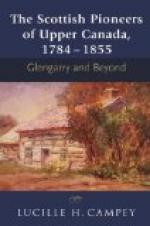Hearne remarked, in 1772, that when two parties of Athapaska Indians met, the ceremonies which passed between them were very formal. They would advance within twenty or thirty yards of each other, make a full halt, and then sit or lie down on the ground, not speaking for some minutes. At length one of them, generally an elderly man, broke silence by acquainting the other party with every misfortune that had befallen him and his companions from the last time they had seen or heard of each other, including all deaths and other calamities which had happened to any other Indians during the same period. When he finished, another orator, belonging to the other party, related in like manner all the bad news that had come to his knowledge. If these orations contained any news that in the least affected either party, it would not be long before some of them began to sigh and sob, and soon after to break out into a loud cry, which was generally accompanied by most of the grown persons of both sexes; and sometimes it was common to hear them all—men, women, and children—joining in one universal howl. When the first transports of grief had subsided, they advanced by degrees, and both parties mixed with each other, the men with the men, the women with the women. They then passed round tobacco pipes very freely, and the conversation became general. They had now nothing but good news left to tell, and in less than half an hour probably nothing but smiles and cheerfulness would be seen on every face.
One direction in which the Amerindians did not shine was in their treatment of women. This perhaps was worse than in other uncivilized races. Woman was very badly used, except perhaps for the first year of courtship and marriage. Courtship began by the young man throwing sticks at the girl[10] who pleased his fancy, and if she responded he asked her in marriage. But not long after she had become a mother she sank into the position of a household drudge and beast of burden. For example, amongst the Beaver Indians, an Athapaskan tribe of the far north-west, it is related by Alexander Mackenzie that the women are permanently crippled and injured in physique by the hardships they have to undergo. “Having few dogs for transport in that country, the women alone perform that labour which is allotted to beasts of burden in other countries. It is not uncommon whilst the men carry nothing but a gun, that their wives and daughters follow with such weighty burdens that if they lay them down they cannot replace them; nor will the men deign to perform the service of hoisting them on to their backs. So that during their journeys they are frequently obliged to lean against a tree for a small degree of temporary relief. When they arrive at the place which their tyrants have chosen for their encampment, they arrange the tent in a few minutes by forming a curve of poles meeting at the top and expanding into a circle of twelve or fifteen feet in diameter at the bottom, covered with dressed skins of the moose sewn together. During these preparations the men sit down quietly to the enjoyment of their pipes, if they happen to have any tobacco.”




